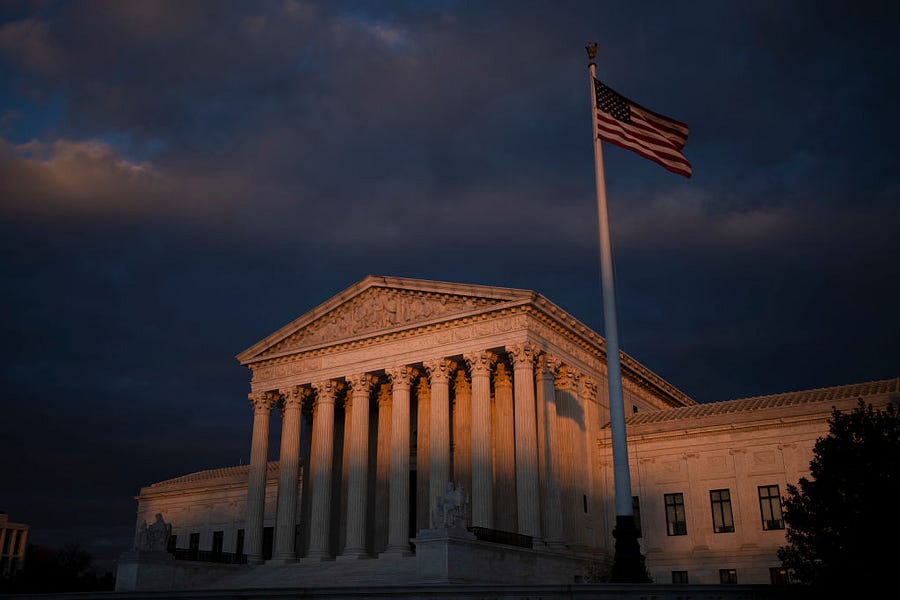Today, the U.S. Supreme Court hears Dobbs v. Jackson Women’s Health Organization, among the most significant cases in a generation. The court will consider whether states may prohibit pre-viability abortions. Deciding they may could lead the court to overturn Roe v. Wade and Planned Parenthood of Southeastern Pennsylvania v. Casey, which would cause waves across American law, culture, and politics.
Roe and Casey, the 1992 decision that reaffirmed Roe and prohibited pre-viability abortion regulations that pose an “undue burden,” put the court at the center of arguably the most heated debate in social policy and, in doing so, touched the most fundamental and contested principles in American governing: self-rule, pluralism, federalism, equal protection, substantive due process, natural law, stare decisis, and more. As such, Dobbs invites sweeping, passionate arguments about the most interesting abstract concepts. This is particularly true across much of the political right, where it is widely held that Roe and Casey were wrongly decided and have distorted law and politics ever since.
Though such arguments are unquestionably important, they are unlikely to carry the day in Dobbs. This is not a case about relitigating Roe and Casey. In fact, all six of the current Republican-appointed justices probably would have voted against Roe had they been on the court in 1973. The issue before the court today is what to do given that Roe and Casey have been on the books for decades.
This involves more than the strength of precedent—the extent to which the Supreme Court should preserve those decisions for the sake of continuity and predictability. All six of today’s more conservative justices—using various rules of thumb for assessing when precedents should be overturned—probably see the legal merits of ending the Roe/Casey era.
Instead, the key question is whether five justices can be convinced that there is something sounder—more constitutionally defensible, more workable, and not too politically radioactive—that can replace Roe/Casey. The most important storyline in today’s oral argument will be whether Mississippi, in defending its 15-week abortion ban, can argue that there is.
Many abortion opponents will be frustrated that it will be insufficient to show that Roe and Casey were wrongly decided and meet the criteria for being overruled. Actually, that will probably be enough for Justices Clarence Thomas, Samuel Alito, and Neil Gorsuch. But Chief Justice John Roberts and Justices Amy Coney Barrett and Brett Kavanaugh—call them the “key three”—will need more persuading. They are not “Let justice be done though the heavens fall” types.
As I’ve argued before (and tried to demonstrate graphically) the key three are conservative in judicial philosophy but also conservative in temperament. Their restraint reveals itself in a number of ways—for example, penning narrow decisions, avoiding dramatic holdings, and hoping to maintain the court’s public standing. They prefer to move judiciously (if not cautiously); they give the impression of staying mindful of the dangers of going too far too fast. The Dispatch’s own Sarah Isgur, in an excellent essay in Politico, fittingly described their approach as “institutionalist,” which includes upholding precedent, producing practical outcomes that support the efficient functioning of government, and preferring incremental and narrow change. Isgur identifies Roberts, Kavanaugh, and Barrett as “conservative institutionalists.”
To sway these three, Mississippi’s attorney must appreciate that they will be thinking less about “Should we overrule Roe and Casey?” and more along the lines of “What happens to law, politics, and the court if we were to overrule Roe and Casey?” But Mississippi’s brief—and most briefs filed by those supporting Mississippi’s side—focus on the former question.
It should be noted that Mississippi provides a forceful argument on that score. From its crisp opening—“On a sound understanding of the Constitution, the answer to the question presented in this case is clear and the path to that answer is straight”—the brief argues Roe and Casey were “egregiously wrong,” that they are “hopelessly unworkable,” and that the case for overturning them is “overwhelming.” Its hardest-hitting sentence reads: “Roe and Casey are unprincipled decisions that have damaged the democratic process, poisoned our national discourse, plagued the law—and, in doing so, harmed this Court.” In a follow-up brief, Mississippi calls Roe/Casey “indefensible.”
A number of other briefs offer strong arguments against Roe/Casey. Several note the 14th Amendment’s protection of life, the negative influence of Roe/Casey on the judicial confirmation process, and the flaws of Casey’s “viability” line. The Ethics and Public Policy brief argues that the historical record demonstrates neither the Ninth nor the 14th Amendment contemplated an abortion right and argues “the greatest enduring threat to this Court’s legitimacy is Roe itself.” The Alabama Center for Law and Liberty cites the many state laws unrelated to abortion that seek to protect pre-viability fetuses. The brief by U.S. Sens. Josh Hawley, Mike Lee, and Ted Cruz—all former Supreme Court clerks—argue that Casey’s “novel and amorphous” undue burden standard produces unpredictable, shifting, and “utterly unworkable” results. A brief from nearly 400 state legislators argues that state legislatures are best positioned to define and balance unenumerated rights.
The briefs opposing Mississippi’s ban defend Roe and Casey, arguing, for instance, they “were and are correct” and reflect a proper understanding of due process and equal protection. They also underscore the importance of upholding precedent; a common refrain among briefs supporting the Jackson Women’s Health Organization is that Roe has stood for a half-century.
But some go further, making the case that it would be risky and unwise, even dangerous, to replace the Roe/Casey framework. Dismantling it would produce “chaos” and “upheaval”; the American Bar Association argues against taking that “perilous step.” The respondents even imply that overturning Roe/Casey could destabilize precedents favored on the right, like those related to gun rights. You can disagree with these briefs, but you must concede that they understood the assignment. Such arguments are designed to heighten the types of concerns on the minds of the key three.
Indeed, an interesting motif in a couple briefs arguing to uphold Roe/Casey (including one by the Biden administration’s Department of Justice) is the invocation of Justice Barrett’s concurrence in last term’s Fulton v. City of Philadelphia. Barrett implied she favored overruling a longstanding precedent—a precedent that several of her conservative colleagues said should be overruled. But she voted not to overrule because, in part, she wasn’t convinced there was a workable replacement at the ready. Jackson Women’s Health Organization’s brief explicitly cites Barrett and then argues that Mississippi “has nothing serious to offer” to replace the viability line central to Casey’s holding and that the state’s alternatives are “impractical” and “unstable.” After citing Barrett, the DOJ’s brief refers to Mississippi’s “inability to offer any workable alternative” and says the state’s “terse” discussion of consequences “does not even begin to explain” how the court would address future cases if the state’s argument succeeded. It is not hard to see that these briefs were written with Barrett’s brand of restraint in mind.
However, Mississippi and several amici do offer the outlines of a Roe/Casey replacement. Mississippi’s brief argues for returning abortion to the political process: Since the Constitution says nothing about abortion and since the right to abortion is not a liberty deeply rooted in American history or tradition, such matters should be left to state-level policymaking. As the state’s reply brief argues, “When this Court returns this issue to the people, the people can debate, adapt, and find workable solutions.” But the key three are likely to wonder, “What are the limits of what states can decide?”
The pro-religious liberty Becket Fund argues Roe/Casey should be “replaced with a standard that hews to the text, structure, history, and tradition of the Constitution.” Though the brief implies the abortion debate should be returned to state legislatures (like capital punishment and assisted suicide), the key three will likely wonder, “Are all state abortion regulations consistent with the structure, history, and tradition of the Constitution?”
The National Right to Life’s brief is probably the most focused on creating new standards to guide courts’ review of abortion laws. It offers a new “roadmap” that would dispense with most of the current rules in an effort to end today’s “jurisprudence of doubt.” It would, among other things, erase the distinction between pre- and post-viability, require courts to consider state interests across all phases of a pregnancy, and require courts to assess asserted state interests under normal rules of scrutiny. The brief’s central point is that a clear set of principles are required because otherwise the court could answer the single, narrow question under consideration—whether all pre-viability abortion bans are unconstitutional—but leave a mountain of other questions unanswered. However, the brief gravely disappointed many by failing to call for the overturn of Roe-Casey, serving as a warning that if the key three prioritize procedure over principle and modesty over mettle the opportunity provided by Dobbs could be squandered.
By the time oral arguments begin, Mississippi’s brief, in conjunction with the amicus briefs aligned with it, will have probably solidified the sense among the six more conservative justices that Roe and Casey were wrongly decided and that there is a strong case for overturning them. But we know of the key three’s restrained, institutionalist tendencies. So how does Mississippi thread the needle?
One of the best lines in any of the briefs comes from the Becket Fund: “Institutional sins are often the hardest to repent of, because they require later-arrived institutional actors to make themselves accountable for their predecessors’ errors.” Today, Mississippi’s best strategy for winning a majority is to unabashedly name the sin while also clearly and fully describing a compelling, principled path to redemption.







Please note that we at The Dispatch hold ourselves, our work, and our commenters to a higher standard than other places on the internet. We welcome comments that foster genuine debate or discussion—including comments critical of us or our work—but responses that include ad hominem attacks on fellow Dispatch members or are intended to stoke fear and anger may be moderated.
With your membership, you only have the ability to comment on The Morning Dispatch articles. Consider upgrading to join the conversation everywhere.